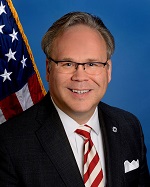 NCUA headquarters. (Source: NCUA)
NCUA headquarters. (Source: NCUA)
The 2021 NCUA budget faces as uncertain future, as board member Todd Harper made it clear Wednesday that he sharply disagrees with the document prepared by Chairman Rodney Hood.
"As I mentioned at last month's board meeting, the draft budget concerns me, especially in light of the safety and soundness implications that the credit union system may soon face because of the pandemic's economic fallout, the priorities of the agency related to consumer financial protection and the general transparency of the NCUA budget," Harper said during an agency budget briefing.
Recommended For You
During the budget session, Hood and Harper clashed over whether the agency needs an increase in consumer protection staff.
NCUA CFO Eugene Schied said that while the pandemic has presented serious challenges, "we're making sure that we're well-staffed in the field." He said that none of the regional offices requested additional staff members.
 Todd Harper (Source: NCUA)
Todd Harper (Source: NCUA) He added, "I think we demonstrated we can perform well in a remote posture."
Approval of the 2021 budget is likely to depend on the vote of incoming board member Kyle Hauptman, who was confirmed by the Senate Wednesday. If Republican Hauptman votes with Hood, a Republican, the budget is likely to be approved, but if he sides with Democrat Harper, the budget is doomed.
Hood noted that Hauptman's confirmation vote was occurring at the same time as the budget meeting. He said he looks forward to having Hauptman sworn in as soon as possible.
The NCUA is proposing a $315.6 million operating budget for 2021, a 0.1% decrease compared to the agency's current budget.
The agency estimated that its 2022 budget will reach $341.8 million.
Combining the agency's three budgets — operating, capital and the administrative budget for the Share Insurance Fund — the agency projected an overall budget of $342.5 million, which is 4.9% less than the agency projected for next year and 1.4% less than in 2020.
 Rodney Hood
Rodney Hood The NCUA estimated the agency will end this year having spent $18.3 million less than the board budgeted for the year. Most of the savings came from travel budget savings, as agency employees and examiners worked remotely.
The agency proposed to use a portion of the savings to hire one new consumer protection compliance officer.
That was not adequate for Harper.
"Adding just one person next year to develop tiered examination procedures up to and including FFIEC-approved examination procedures, lead consumer financial protection compliance reviews conducted at credit unions with higher compliance risk profiles and assist in developing training materials for examiners and credit unions is simply not enough," he said.
In addition, he said, the budget does not include sufficient funds for examinations, adding that during the 2008 financial crisis, the NCUA returned to a 12-month examination cycle and increased field resources.
"We have a duty to prepare for any economic fallout," he said.
Hood said he does not believe that additional consumer protection staff is needed.
He said agency funding comes from credit unions. "We, as an agency should take great care when directing the agency's limited resources to open-ended new commitments and we should seek to avoid new compliance requirements without fully considering the impact on credit unions and their budgets," he added.
Hood said he would be in favor of beefing up consumer protection staff if the CFPB transferred all supervisory powers over credit unions to the NCUA.
The hearing also featured comments by the officials of three major credit union trade groups. The witnesses said that while the NCUA budget is decreasing in 2021, most of the savings comes from a reduction in the agency's travel budget.
CUNA Chief Economist Mike Schenk said he believes the budget document does not include sufficient justification for the hiring of new employees at the NCUA.
He added that CUNA does not see the need for an increased consumer protection staff. "The agency provides no supplementary evidence to suggest credit unions' consumer compliance management has become a risk area warranting an increased expenditure of agency resources," he said.
NAFCU Chief Economist and Vice President of Research Curt Long said the NCUA budget has increased 44% in a decade, while the credit union industry is on pace to consolidate by 31% over the same time frame.
"Considering the cost savings from 2020 due to reduced travel expenses, the NCUA should quickly pivot to more virtual exams going forward, and incorporate lessons learned to achieve reductions by cutting unnecessary travel and other expenses," Long said.
NASCU President/CEO Lucy Ito said while she appreciates the agency's open budget process, she is not sure that recommendations made by the witnesses are adopted.
"While I believe that (the) NCUA is genuine in gathering perspectives to improve its budgeting process, I cannot say that I can identify the suggestions that have been taken up over the last few years," she said.
© Touchpoint Markets, All Rights Reserved. Request academic re-use from www.copyright.com. All other uses, submit a request to [email protected]. For more inforrmation visit Asset & Logo Licensing.






